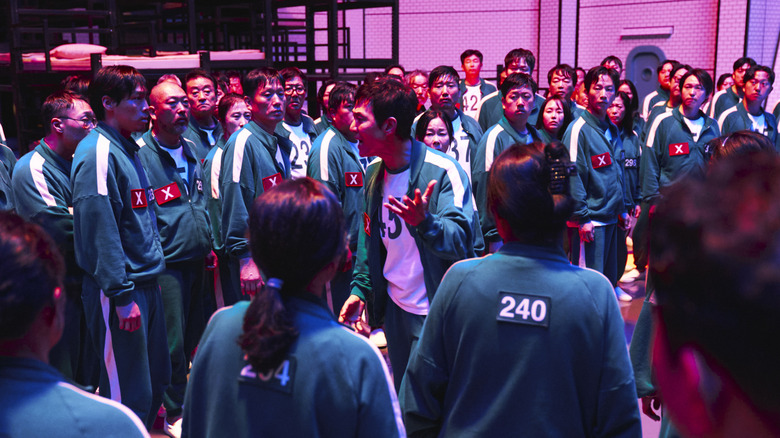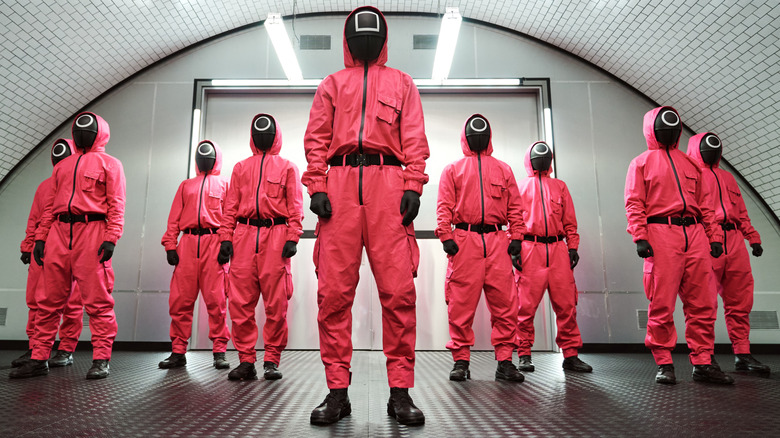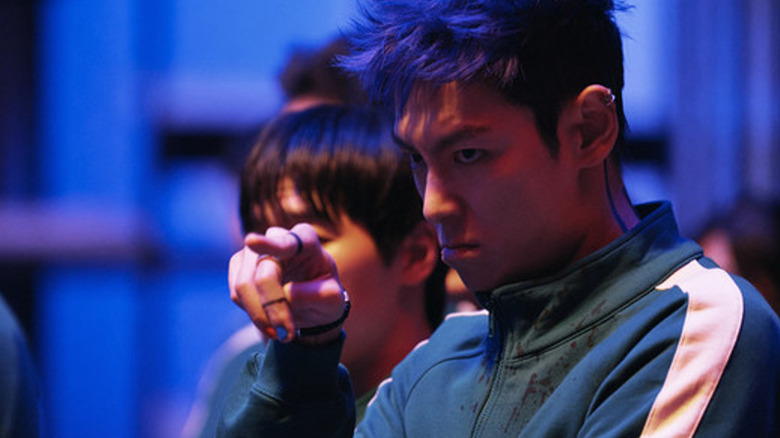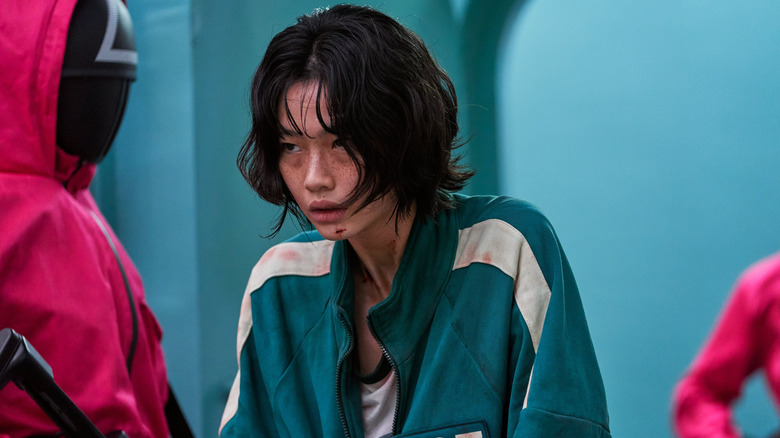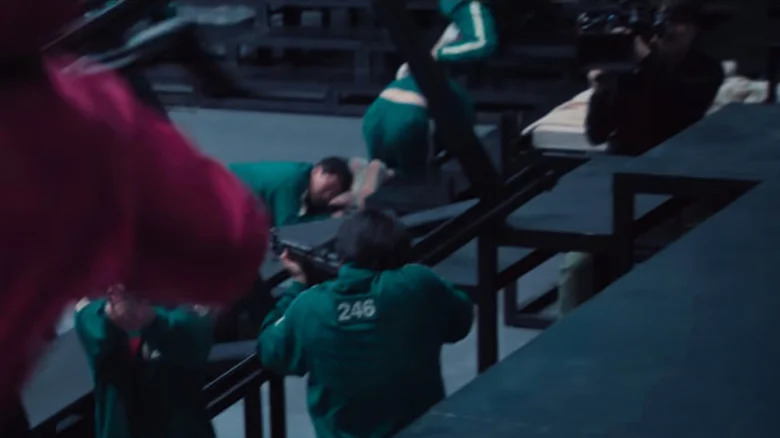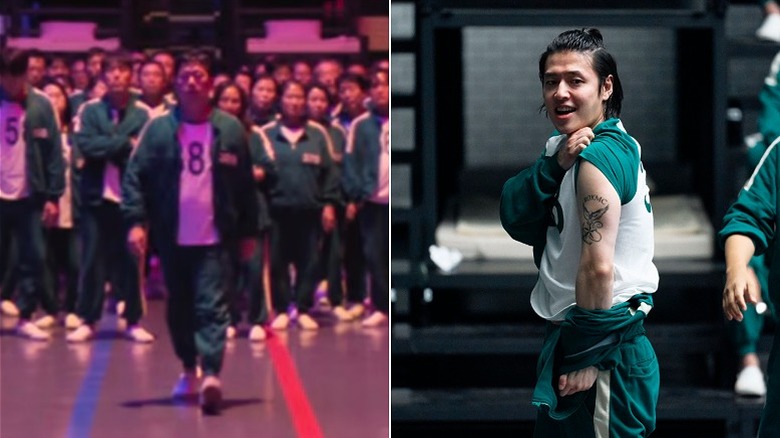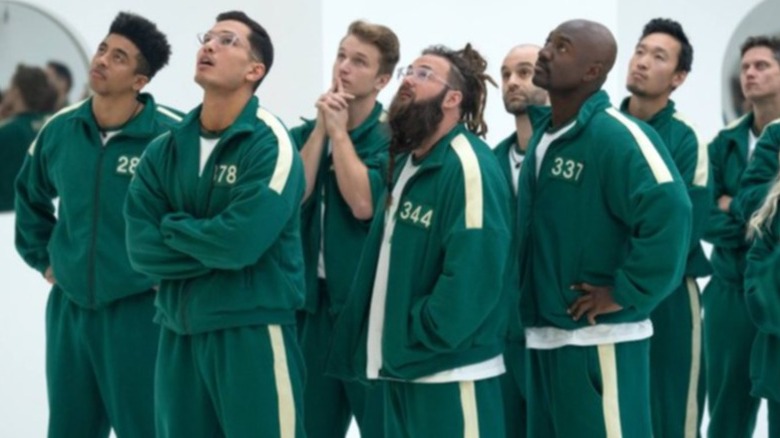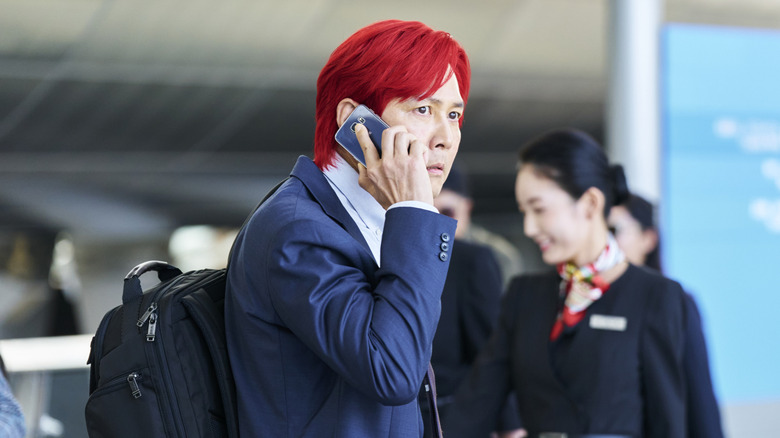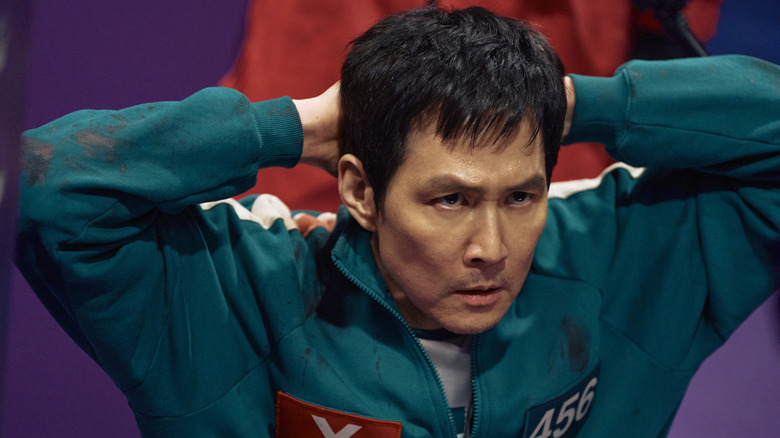Squid Game Moments That Made Us Beyond Angry
Contains spoilers for "Squid Game" Season 2
Even the best series out there will have some flaws and faults. "Squid Game" may be well-loved by the majority of its audience and a whole lot of critics, but plenty of fans have expressed their anger and disgust over various things the show has managed to do wrong — well, at least in their eyes. And in ours as well.
There have been notable onscreen bloopers, unsolved plot threads, and even infuriating plot choices linked to the franchise at large. While some fans might be here for reality game shows with a "Squid Game" label attached to it or a plot twist that made audiences wonder if the whole show is misogynistic, others rebelled, vowing not to watch the series anymore. And to be frank, sometimes we're more than willing to join them. Here's an assortment of "Squid Games"-related moments that made us beyond mad at the Netflix hit.
The ending of Season 2 has few fans
The finale of the second season of "Squid Game" has gotten a lot of flack from fans. In fact, response to the episode has been so negative, the show's creator has stepped forward to defend his choice. For the uninitiated, the ending of Season 2 of the action-drama involves Gi-hun (Lee Jung-jae) trying to start an armed rebellion against the Front Man (Lee Byung-hun) and his pink-clad guards. He and the remaining players steal the guns off the guards and a bloody battle ensues. But the wheels fall off of the campaign, and the Front Man wins, executing Jung-bae (Leo Seo-hwan) in front of Gi-hun as punishment for his choices. The most frustrating part of the entire situation is that Gi-hun still doesn't know that the Front Man entered the 2024 games as Oh Young-Il, who had gotten close to our protagonist. In-ho faked his death to return to his behind the scenes role, killing his "teammates" along the way.
Viewers flooded X, formerly known as Twitter, to call the ending predictable, boring, and overhyped. "Squid Game season 2 was so disappointing for me. The story telling was lacking. They built up the characters and relationships but found them still lacking in complexity like the first season," said @parallaxcinemas. They added that even the death scenes didn't impress, nor did the games. Indeed, the last episode of Season 2 has the lowest rating on IMDb, hinting that audiences might not be willing to endure a third round.
Indeed, while the ending may feel like a Front Man plot twist that just rehashes Season 1's revelation about Oh Il-nam (O Yeong-su), creator, director and writer Hwang Dong-hyuk disagrees. He told Entertainment Weekly that he decided to have the season end on a cliffhanger for a good reason. "I thought that that would be just the right moment to end the story," he explained, adding that he felt it would stoke audience enthusiasm, not irritation. Time will tell if it pays off for him.
Thanos' general existence sparked controversy
Thanos (Choi Seung-hyun or T.O.P.) has been quite the divisive character for "Squid Game" fans. While other characters have been unpopular on the show before, he's definitely drawn the highest amount of brickbats for Season 2. This is mostly due to his egocentrism and qualities that fans have termed "grating."
Named for the Marvel character, Thanos is a rapper who lost all of his money in a bitcoin scheme. That leads to his participation in the games, but he's highly unprepared for their deadly rigors. His participation does nothing but cause Gi-hun headaches by rebelling against his attempts at organizing a revolution to create his own squad. He cheats relentlessly at the games, even causing the deaths of several players. He also attends the trials with a crucifix filled with pills, an unidentified drug which he consumes. When he's not getting high, he's goofing off.
None of this behavior endeared him to fans, who challenged one another on the "Squid Game" subreddit to think of a quality that made Thanos bearable. The Korean media has also been particularly harsh, with one outlet demanding Seung-hyun "apologize to the international audience" for his acting. Though a chunk of the fandom praised T.O.P.'s acting, noting that the audience's hatred of the character the means he's successful in the role, some never warmed up to him. When he ultimately takes a fork in the neck during a bathroom brawl at the hands of Lee Myung-gi (Im Si-wan), some viewers feel that his death was much delayed.
Kang Sae-byeok's murder points toward an ugly trend
The death of Kang Sae-byeok (Jung Ho-yeon) has long been one of the most tragic, moving, and depressing deaths of the series. But that's not a reason why many fans have come to loathe it. No, the loss of her character stands as a monument to the very rough way women are treated on Squid Game — and the fact that her sudden death exists simply to motivate the characters around her instead of relating to her own character flaws.
Kang Sae-byeok is stabbed to death by Cho Sang-woo (Park Hae-soo) after incurring an already-severe wound from an explosion at the end of the glass bridge game. This has nothing to do with the thief she was before the games, or the loving friend and sister she's become: It happens simply to motivate Gi-hun's rebellion against the game in a classic act of fridging.
To be fair to "Squid Game," its men die as violently as its women. But most of those men die due to their own hubris. Only one woman — Mi-nyeo (Kim Joo-ryoung) — is killed by her own flaring temper during Season 1, in an act of revenge against her lover. Mi-na's (Song Ji-woo) death by bee in Season 2 also reflects this. But Kang Sae-byeok's death is strongly echoed in the Season 2 passings of Se-mi (Won Ji-an) — who is stabbed to death in a fight during the games' annual vote — and Young-mi (Kim Si-eun), who is shot during the Mingle game in Season 2, Episode 6. That death seems to exist simply to motivate Cho Hyun-ju (Park-sung hoon). Time will tell if it does more than that.
A camera man was left in during a pivotal Season 2 finale moment
This mistake is more of an apparent editing error, but some fans were mildly upset by it due to the fact that it happened during a highly important plot point. During Episode 7 of Season 2, as Gi-hun leads his rebellion, among the flying shrapnel and falling comrades, a cameraman can be spied among the soldiers.
someone is getting fired from the Squid Games team after one of the cameramen was spotted in the background mid episode 😭😭 pic.twitter.com/iR1rYNc3kX
— ryan 🤿 (@scubaryan_) January 6, 2025
While some folks think this is an intentional plot element (after all, why wouldn't the clients want to see such action close-up?) it feels far more likely that it's an accident. After all, everyone missed that Season 2 finale mistake until @scubaryan_ pointed it out. And that's just irritating enough to make this list. It's pretty inexcusably sloppy for a big Netflix hit — but if it somehow pays off during Season 3, we'll be glad to eat our words.
Player 388 Shape-Shifts
Only someone who's paying really close attention to the show will notice this one. During Season 2 Episode 3, after red light, green light plays out, the surviving participants vote on whether or not they should all stay in the game, with the majority winning. After Gi-Hun votes, Player 388's number is called. The man who stands up is older and has a pot belly. But the next time we see 388, he appears in the guise of Kang Dae-ho (Kang Ha-neul) — who is neither middle-aged or pot-bellied.
Either this is a sloppy act of discontinuity, or it's a brilliant easter egg that hints military man Kang Dae-ho is not who he appears to be. Some fans think he might have been planted in the game by the Front Man to take care of him, since he resurfaces during Episode 4 of Season 2, which is when the Front Man takes on his fake idenity and joins the game. Others think Dae-ho killed the original 388 to take his position. It's another case of infuriating unresolved "Squid Game" plot hole versus brilliant foreshadowing via small plot detail, and time will prove up which it is.
Squid Game: The Challenge
This one was controversial right from the start. Many fans have already accused Netflix of not understand the anti-capitalism message of "Squid Game," pointing out its tendency to merchandize and even sanitize the show in attempt at marketing it to younger consumers. "Squid Game: The Challenge" is the most egregious example of this: A reality gameshow that replicates the experience of playing those frightening games without the risk to life and limb. Contestants are "killed" when they fail their challenges via the triggering of an ink pack on their bodies, leading to their removal from the game. A large cash prize and obscure children's games being played with tenacity are the other threads connecting it to the original series.
"The Challenge" was popular enough to snag a Season 2 renewal, but critics lambasted it, calling it dull. That was a point of view plenty of watchers came away with, too — they said it was disappointing and staged. On top of that, a group of former Season 1 contestants spoke out to Rolling Stone Magazine about the inhumane treatment they say they were subjected to and claiming the show was rigged. When Season 2 airs, the future of the series will be forever determined.
What happened to Gi-hun's red hair?
This is a minor detail to get steamed about, but it's pretty symbolic of the shambolic way Gi-Hun's character development has been handled. At the close of Season 1, Gi-Hun dyes his hair red — to both forge a new identity for himself and in a fierce reflection of his personality growth. But by the time he's living incognito and trying to dig up more information on the Front Man and his games, his hair's dark again.
One can understand why he'd abandon his colorful new locks — all the better to go incognito. But he's also hiding from the Games' organizers until he decides to make himself a target again. Wouldn't he be less recognizable with a not-as-ordinary look? This is ironically reflected in Gi-Hun's Season 2 character arc. While he's undeniably bolder and still as kind as always in those seven episodes, he remains credulous, a fact that nearly gets him killed and costs the lives of many of his allies.
Gi-hun's rebellion was poorly conceived
Gi-hun's goal has been clearly stated and obvious from the beginning of Season 2: End the Squid Games, by any means necessary. But for a guy who spent months plotting out his revenge, his actual attempt at a game-stopping coup is so poorly thought-out it's no wonder it fails, leaving a trail of plot holes behind.
Why do his friends agree to take part in a suicide mission that's only going to get them killed against impossible odds, endangering their hope of getting the money they need? Why does no one bother to check around for more ammo before they go in search of the control room? Why does Gi-hun not consider the massive odds stacked up against him before trying to pull off the impossible? Why does Kang Dae-ho only get war flashbacks during their gun battle with the pink soldiers, and not during the many sniper attacks he sees during the competition? All of it reads like "it's in the script"-style decision making — which bodes ill for the show's final segment.
While it might be a bit of character development for Gi-hun to agree to kill off the X players willing to stay in the game to protect the O's, it feels like too quick of a switch-up for him, especially because he entered this game to save everyone. Hopefully, we'll get to see something more coherent during Season 3 and they'll fix some of these issues when it resolves Season 2's cliffhanger.
